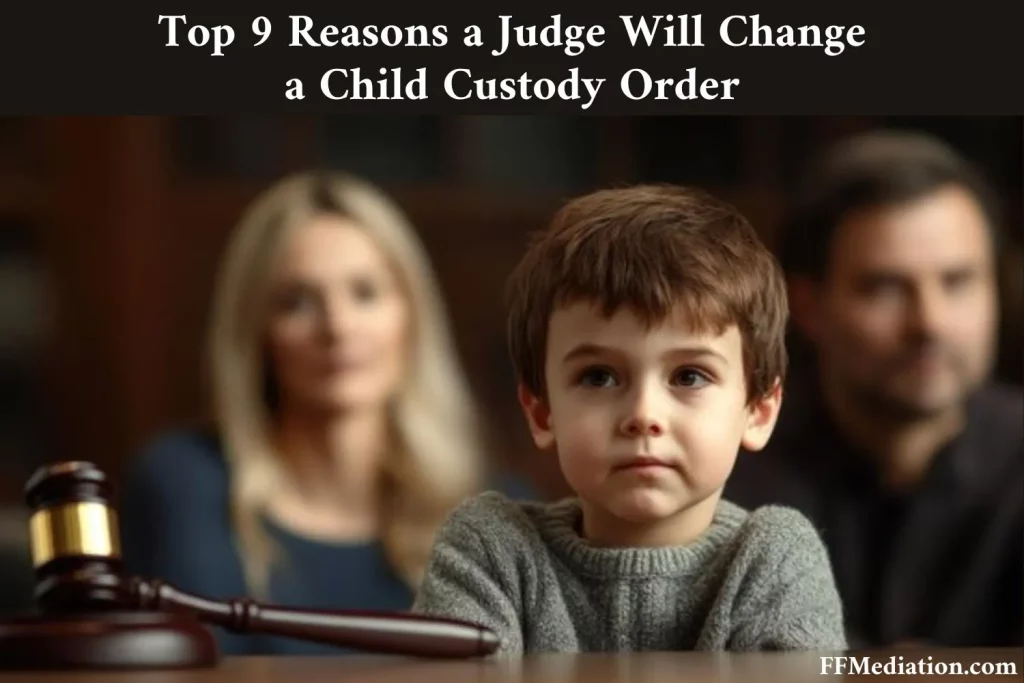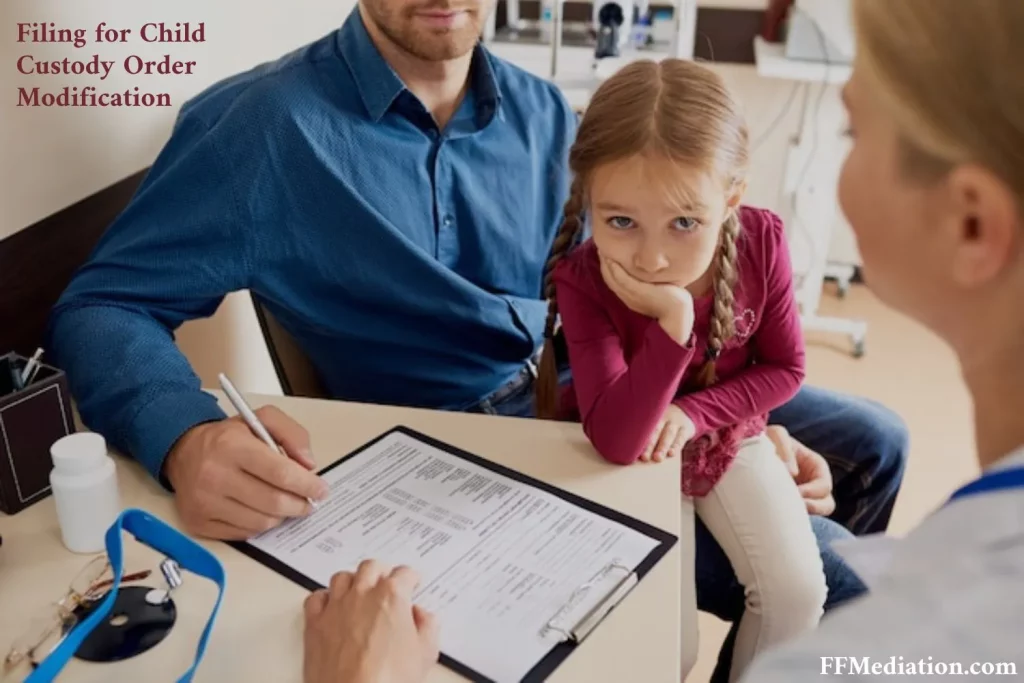
Providing Divorce Mediation Services Throughout California
Providing Divorce Mediation Services Throughout California
Home » Divorce and Family law Blog » Top 9 Reasons a Judge Will Modify Child Custody

If you have a custody agreement with your ex-spouse/partner and wonder, “Why would a judge modify the arrangement?” you have come to the right place. We will discuss why a judge would do this and how you can file for such a change if these reasons apply to your situation.
Child custody mediation at Families First Mediation can help you modify your agreement outside court. Helping you and your family come to an agreement without waiting months to over a year, book a FREE Divorce Mediation Consultation with their lead mediator, Dina Haddad.
The needs and well-being of your child(ren) will be the judge’s primary concern. When we say that, we don’t mean “if they have snacks in the pantry,” wants.
We mean their needs, and according to California Courts self-help guide, these are a few of these needs that the judge will ask to review.
“To decide what is best for a child, the judge considers:
Then, the judge decides based on what’s in your child’s best interest.”
You need to consider these essential things if you are (1) facing a custody agreement modification or (2) requesting one.
If one of the custodial parents is considering moving, depending on how far you want to go, you might have to submit a relocation request.
In the eyes of the court, a parent’s relocation can severely impact the current arrangement in place, especially if you want to move to a different city/county.
In California, for your child(ren) to tell the judge what their desired living arrangement is, they will have to be at least 12 or older.
As they get older – their input matters to the judge. However, they can’t precisely ‘choose’ where to live until 18.
Their preferences will be considered when the judge is modifying the custody agreement, and since they are 12 or older, the court has the option to listen to the child’s preferences. However, as a general rule, the judges prefer not to ask the children their preferences.
Suppose you feel that your child is ever unsafe or that they may be being harmed during their time at your co-parent’s home.
You should report it immediately. Gather as much evidence as possible, such as pictures of any bruising or notable signs of neglect in your case.
Once you have solid proof, you can submit an appeal to the courts to modify the agreement, and if you don’t want your child to go back there until the court date, you can get an emergency custody order.
If one of you (you or your spouse) does not agree with and is not compliant with the custody order, the judge can modify it if there is just cause.
If the one seeking a custody modification cannot get consent from their co-parent, they will have to submit their request to the court.
Let’s say that you recently changed jobs, and instead of the standard 9-5 that you had before, you are now doing 10 or even 12 hour work days.
Or you are changing your lifestyle and aren’t as “hands-on” with the child(ren) as you used to be. If the other parent doesn’t feel that you are using your time appropriately and are neglecting your child’s needs, they have the right to request a modification to the agreement.
The judge will review your new circumstances and decide if the child should be with their other custodial parents more often. (Assuming you have 50/50).
According to Bednarczyk & Valerio, LLP, in an article by Ania Bednarczyk:
“Parents may agree to voluntarily modify an existing custody agreement if they find the current agreement no longer works.Parents can work together to create a custody arrangement that meets their child’s and family’s needs when a change in their family situation arises.”
At Families First Mediation, we include specific language to allow our parties to make these kinds of modifications without having to return to mediation or get another court order.
Holiday and vacation time can be a big part of a custody agreement many co-parents bicker over. Let’s look at an often recurring scenario to help you understand whether the mother has the child(ren) during Father’s Day in the agreement or vice versa.
See the problem? Now, suppose the other parent can agree on changes in the agreement and be flexible with the order. In that case, they can work together to create a new parenting plan and have a judge sign the modification to make it legally binding. This is the easiest way to do it and way less expensive than going to court.
In an article on Psychology Today by Michael J. Formica, “Within this context, children may also become the currency of abuse.
The abuser uses them–their affection, their availability, and even their loyalty to the abused parent–to leverage the parent, who is the target of alienation.
They become weaponized. Emotional abuse is a much more powerful–and damaging–tool than physical, financial, and even psychosocial abuse, and, given our attachment to our children, that much more devastating.”
The court (especially nowadays) takes parental alienation seriously. Often, the person initiating the alienation will slip up somewhere.
If you have text messages admitting they are saying negative things to their children about you, you can submit the proof to the court to help your case.

If any of the above 9 reasons resonate with you, you should file for a child custody order modification. Just ensure that you have everything that you need for your case to prove why the judge should modify the order.
What exactly happens at a custody modification hearing? Well, a few things actually:
Mediation can take less time to apply modifications to the agreement than it would through court.
The process can take a few weeks and a maximum of a couple of months, while if you were to go through court, it can take seemingly forever.
It could even take over a year for your modification court date! If you don’t want to take the longer route, mediation would be your best bet to make things official.
When preparing for a child custody mediation session there are some Dos and Don’ts of child custody mediation.
You should come prepared beforehand by researching and brainstorming ideas on what you want to cover in the session.
Gather what you feel are essential documents and write down issues you want to discuss with your mediator. Approach the mediation session with an open mind; no big project can be successful otherwise.
During the mediation session, don’t forget to take your co-parent’s perspective – it may be challenging, but in the long run, it will help you see things from their point of view that you may not have considered. This goes without saying, but don’t dress too casually. Respect your mediator and everyone involved by dressing professionally; otherwise, you will come off as untidy and unprofessional.
The best service that you could use in California is Families First Mediation.
Ran by their head mediator, Dina Haddad, the company wants nothing but for you to succeed in your custody agreement, both for yourself and your child’s sake.
They will do everything they can to help you if you feel lost and confused. Navigating the custody process can be lonely and scary to those who are new to co-parenting. Dina Haddad takes great pride in her work, ensuring that she and her subordinates go above and beyond what you would expect from a mediator. And don’t worry; she and other mediators at Families First Mediation have years of expertise under their belts to give you the best experience possible.
When it comes to child custody cases, you need to take your child(rens) best interest at heart. It is definitely a hard process to go through, but it can be easier with the support of your families and friends and even your mediator.
Families First Mediation uses high-quality sources, including research papers, academic research institutions, journals, and think tanks to support the facts and maintain content accuracy. This ensures our esteemed audience receives reliable information.
There can be a list of reasons that are considered typical. Relocation, abuse or neglect, a change in the child’s needs, and non-compliance are all things that the courts would consider as common ground.
It depends on the route you are taking. Court can be expensive no matter what since court fees typically range from $200 to $500, depending on the county.
But if you are doing mediation, it can be a few hundred dollars at most, depending on who you go through.
If you disagree with the custody agreement put into place, you can appeal if you feel that the judge made a legal error.
When appealing, there are a few things that you will need to get through (like filing a notice of appeal), but you can get a fairer settlement or even entirely reverse a judge’s mistake.


Families First Mediation is a pioneer in the field of divorce mediation. Our entire divorce mediation team takes great pride in being active trainers, divorce mediators and teachers of mediation in the greater California area. If you are considering a collaborative divorce, legal seperation or looking for a san jose divorce lawyer we have services that may be beneficial to you. Take advantage of our vast expertise and background in the field of divorce mediation and our genuine desire to help with your divorce mediation services.